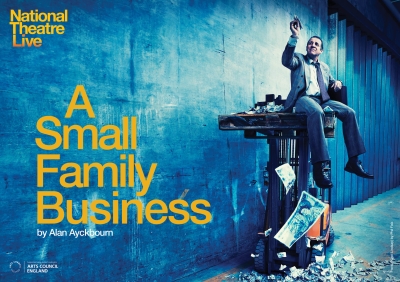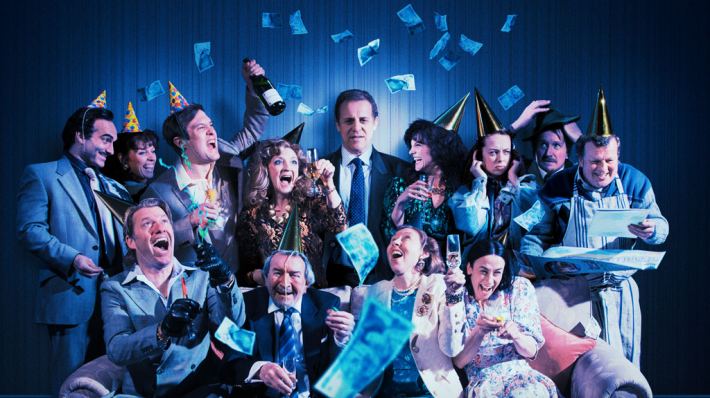Since the NT Live series of satellite broadcasts of performances from London’s National Theatre debuted five seasons ago, I’ve seen almost all of them. The Amherst Cinema is one of hundreds of venues that bring the stage shows to far-flung audiences who wouldn’t otherwise see them. The shows are captured during regularly scheduled performances and beamed live – or slightly delayed to adjust for time-zone differences – around the world. (Some broadcasts are carried by other theaters in this region as well, including the Mahaiwe in Great Barrington and the Latchis in Brattleboro.)
Last week I was in London and had the happy fortune of catching one of the National’s current productions on the night it was being broadcast. It was Alan Ayckbourne’s A Small Family Business, a wickedly astute and surprisingly – depressingly – timely satire on the mechanics of greed in our outlaw age. I had seen it at its premiere, also at the National, in 1987, and was eager to see how it has held up, as well as to observe the NT Live process from behind the cameras.
For indeed, we were behind the cameras, in the first row of the circle (mezzanine), with an excellent view of both the stage and the cameras ranked across the front of the Olivier Theatre’s stalls. Unlike some NT Live treatments, where cinema viewers can occasionally glimpse a camera operator in the wings or at the back of the stage, this one was shot straight on into the box set.
On this night, four cameras occupy the front rows of the house, each of them rolling on a 10-foot lateral track so that stage-level action can be captured from any angle. As we take our seats, the four cameramen are lounging in the row behind their equipment or checking the cue sheets on clipboards attached to the cameras, awaiting the start. In the middle aisle sits a stationary camera – horizontally stationary, that is, but not vertically. It’s not manned, but remote-controlled, and as we watch, it periodically zooms up and down on a long hydraulic neck and swivels back and forth, presumably being tested and rehearsed for a purpose we are soon to discover.
Along the mezzanine’s façade are pairs microphones, aimed up at us in the circle and down onto the stalls – another piece of the technical setup, designed to pick up laughs and applause for the broadcast.
Facing us on the stage is the red-brick façade of a substantial two-story house in what appears to be an upscale suburban development – the doorway flanked by carriage lamps, lace curtains behind the windows, and the fronts of several identical houses visible on the backdrop.
At ten minutes to 7:00, Emma Freud, the series’ familiar host, strides onto the stage, chic in an elegant all-black outfit. Microphone in hand, she gives us an overview of this evening’s special performance. “Audiences all around the world will experience this show,” she tells us. “Tonight will be the largest reach of any NT Live so far, with several new countries joining us,” including Chile, Peru and Kazakhstan – over 1,100 cinemas in all, in more than 40 countries. “You are a kind of conduit to them, and the cameras will be capturing the audience as well as the stage. So if you’re sitting beside someone you shouldn’t be, I’d advise you to move now, because your secret’s out.”
After smiling through the laugh on that (no doubt well-tried) line, she continues with the admonition to “turn off your mobiles – all the way off, because there’s lots of electronics associated with the broadcast, as you could see from the huge trucks parked outside,” and exits with the promise that “It’s an amazing show. I know you’re going to adore it.”
She seems more genuine than I’ve felt when seeing her introduce previous broadcasts, and assume it’s because she’s just talking to us and not live-to-the-world. But when, on the dot of 7, she reappears, this time addressing one of the cameras, she’s also less simpering than she’s appeared before. Maybe she’s gotten tired of being so damn cute.
She gives a brief introduction to the play, repeats the worldwide audience estimates, promises an exciting intermission feature to look forward to, and cues a preshow video feature on the play, its creators and the ’80s milieu that gave birth to it.
At home in the cinema we see these videos full-screen, but here in the Olivier they’re shown on two comparatively small TV screens flanking the stage. The video features clips of the director, Adam Penford, Ayckbourne and Nigel Lindsay, who plays Jack, and comments that he remembers the 80s, when in fact he worked as a stockbroker, so he knows that scene from the inside. Ayckbourne says that even though the script hasn’t been at all updated, it’s just as relevant today. Things are “still as awful as they were then,” he observes, “and probably a lot worse.”
As the video fades, the podium camera scans the house, then pans around to the stage as the set does a 180 on the turntable stage to reveal the inside of the house – a cutaway cross-section, like an enormous doll’s house. The downstairs foyer is flanked by the sitting room and the kitchen, and on the second floor – so that’s why the podium camera goes up and down: to shoot those scenes on their own level – a bedroom and bathroom, with upstage doors leading into hidden bedrooms.
The cover of the program, and the show’s poster image, pictures a man in a suit seated on a forklift, surrounded by fluttering 20-pound notes and poised to loose a paper airplane made from one of them—a smug neo-capitalist, you’d think. But Jack McCracken, the reluctant hero of A Small Family Business, is the antithesis of that, and therein lies the crux of Ayckbourne’s corrosive farce.
 Courtesy of the National Theatre
Courtesy of the National Theatre
The program also features a quote from Margaret Thatcher, who was Prime Minister in 1987 and whose draconian social and economic policies, tied to a philosophy of bootstrap individualism, were the playwright’s indirect target: “There is no such thing as society. There are individual men and women, and there are families.”
And family, in both the domestic and Mafia sense, is what the play is all about. It begins with a broad trousers-around-the-ankles scene straight out of bedroom farce, but soon adds darker layers of anxiety and intrigue, still couched in farcical, almost sitcom-esque dialogue and situations. Jack, who has just taken over as head of the small family furniture-making business, vows to make it more efficient and profitable, with a business model based on “trust” and everyone responsible for maintaining an atmosphere of scrupulous honesty, “starting with the paper clips.”
Turns out everyone else in the family has been steadily bleeding the business of not just office supplies but sizable chunks of income. And the more Jack tries to stem the flow the further he gets sucked into the very way of life that, to his horror, he’s uncovering.
As Ayckbourne says in a program note, Jack is “a man who is so innocent that he can’t believe anyone else could do the things he wouldn’t, who then believes maybe there is one bad apple only to find the whole barrel is rotten.” The key to the self-aggrandizing, self-justifying world he finds himself mired in, spoken by one of his relatives and echoed by others, is this: “Everybody cheats a little. It’s not dishonest, just a little fuzzy round the edges.”
In this universe where traditional morality has given way to self-interest and naked greed, Jack’s brother doesn’t at all mind his wife’s concurrent affairs with five “Italian businessmen” because what he really loves is his Porsche, his boat and other extravagant possessions he’s acquired with company profits. The period is mid-80s, but aside from the suburban London accents, you can almost imagine the play as a middle-aged parody of Jersey Shore, with the same self-absorption and big hair, done up as a conspiracy thriller played as farce. The large ensemble cast meshes like clockwork, their performances that wee bit inflated without going over the top.
Along with the often frantic onstage action, it’s also fascinating to watch the cameras recording it. We can watch the shot sequence by noticing the red light that blinks from whichever camera is on, and whenever the podium camera starts its ascent we know the action is about to move upstairs. The action, in fact, frequently happens in two or more rooms simultaneously. All of Ayckbourne’s plays have a physical gimmick, and this one’s is the fact that all the houses in the neighborhood, where all the family members live, are identical. So this one house progressively becomes everyone’s house, with geographically separate scenes overlaying each other, sometimes almost in the same room.
As the interval begins, we notice what looks like a bulky music stand being moved from beside the camera Emma Freud addressed in the introduction, to another one. And as the technicians move it, we see it’s a portable teleprompter, displaying the first words of her next segment: “EMMA: Hello, welcome to the interval” it reads. (I wouldn’t want to address half a million people without a cheat sheet either.)
As the audience resume their seats, she takes the stage, faces the camera with the prompter beside it, and introduces the show’s director, Adam Penford. He talks about what it takes to make this serious farce, and large ensemble cast, work. “Timing is key,” he says. “It has to flow fast.” And even though the style is broad comedy, “You need to act it straight, it doesn’t work if you try to make it funny.” His goal, he says, has been to “create normality,” then move toward “the abnormal – what lurks behind the lace curtains. It starts as farce, then slowly becomes a different play altogether.”
And indeed it does. The second act is in its way even more farcical that the first, with crises building on complications as Jack’s attempts to fix things up and paper things over gets him deeper and deeper into quicksand. Ultimately, the play is a not just a parable of greed, but a step-by-step lesson in how the unthinkable becomes ordinary, even necessary. It’s a very funny play, played at lightning speed, with a dark, disturbing undertow.
The Amherst Cinema has encore screenings of A Small Family Business this Monday, June 23rd, and July 12th. I’ll wave to you.
If you’d like to be notified of future posts, email StageStruck@crocker.com



